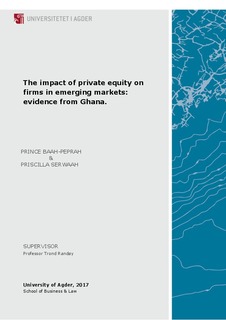| dc.description.abstract | In the last decade, most emerging markets have been associated with new investment opportunities and some growth prospects that attract private equity (hereafter, PE) investors. Regions with growing interest of PE investments include Africa and Asia. Research on PE impact on recipient firms in developed economies are voluminous and has proven that PE plays a remarkable role in firms’ success. Until now, such performance implications on firms in emerging markets are limited in study. Our study focuses on the impact of PE funding on financial performance of firms in emerging markets using Ghana as a case. Using data from both the investors and fund recipients of PE, we empirically assess how the presence and ownership stake of PE investors affect financial performance of recipient firms. We also investigate the influence of post-investment corporate governance mechanisms on the overall financial performance of the recipient firms. We find that, PE backed firms have relatively higher returns on equity (ROE) and growth rate than listed firms though the differences are not statically significant. Also, we find that recipient firms with higher PE ownership stake have high ROE and growth rate than recipient firms with lower PE ownership stake. These findings recapitulate that, though PE investment significantly affects the performance of recipient firms positively, the PE industry is still at a growing stage and young in most emerging markets hence long-term benefits of PE investments would take time to be realized. We also find that PE recipient firms that involve the founders in management irrespective of the stake acquired by the PE investors outperform listed firms in terms of ROE. Finding on the board size of the recipient firms proves that, large board size affects ROE negatively. We therefore conclude that infusion of PE funds, through minority or majority stake, invariably, has a positive influence on recipient firms’ financial performance but higher stake enhances such stimuli. Also, corporate governance mechanisms play a major role in enhancing the positive relationship between PE and financial performance of recipient firms. Our findings are robust and they are empirically and theoretically supported. The findings should however be generalized with caution. This is because, as literature suggests, performance improvements that result from PE may take time to be realized and institutional context may also limit the generalisability of the finding among emerging markets that have vast institutional differences from Ghana.
Keywords: Private equity, corporate governance, emerging markets, financial performance | nb_NO |

